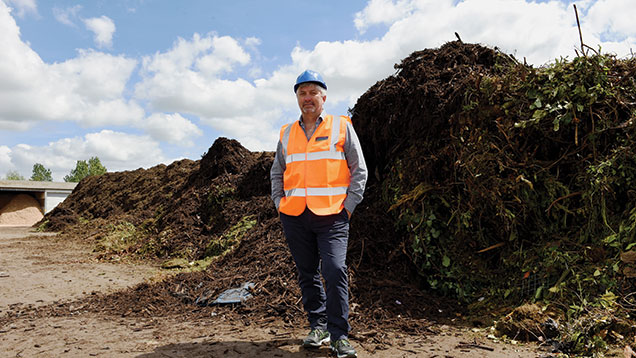Farmers Weekly Awards 2015: Sustainable Farmer of the Year

John Pitts
The Woodhorn Group, West Sussex
Profit is vital for the long-term success of any business, says John Pitts, of the Woodhorn Group at Oving, near Chichester, West Sussex.
And profitability is also the first and most important cornerstone of a sustainable farm, he believes.
The Pitts family have been tenants of the Church Commissioners at Woodhorn Farm since 1882.
John is a fourth-generation farmer and took on the tenancy age 26 in 1990.
At the time, the Pitts were farming conventionally with about 365ha of wheat and oilseed rape, combined with a dairy herd of 180 cows.
See all the winners and pictures from the night on our Farmers Weekly Awards page.
Today, the business is certified organic and has grown to more than 600ha with 240 dairy cows. The farm also has its own composting business.
“I am a farmer,” says John. “It is in my blood and in my soul. There are many ways to farm and there is no right or wrong way – merely the way that works for you. But I have been fortunate to be able to explore and develop the way that works for me.”
The single biggest change was to convert to organic production in 2000.
“This decision was taken partly for personal reasons – I used to do all the spraying – but the business case had to stack up as well.”
Farm facts
- 600ha organic dairy and arable
- 240 cows and 100 youngstock
- Wheat, barley, maize and legumes
- Composting, retailing, renewable energy and lettings
Today, milk is marketed through the Organic Milk Suppliers Co-operative (Omsco).
Mastitis is managed through a combination of Swiss Red genetics and sand bedding. Average yield for the autumn-calving herd is about 8,200 litres.
All organic crops are benchmarked against their conventional equivalent and all field operations and inputs are costed to ensure business performance is a crucial part of every decision.
Organic barley yields only 15-20% less than conventional crops.
Some 75ha of maize are grown, of which about 25ha are grown for silage.
The rest is grain maize.
“Because we are organic, we don’t use a seed dressing and the rooks love the seed. We employ people to scare the rooks which costs £60-£75/ha. It sounds a lot, but if you were a conventional farmer you wouldn’t question spending that on sprays.”
Winning ways
- A multifaceted business that plays to its best assets
- Constantly challenges the way the farm operates
- All parts of the business are financially sustainable
- High quality of management across all areas
- Oozes passion, innovation and professionalism
A major farm diversification involves green and wood waste recycling.
The farm now operates two recycling sites with a total capacity of 100,000t annually.
Compost was initially spread on farmland, but has led to the development of the farm’s own Earth Cycle brand of compost and soils.
“This includes our ‘cow compost’ from the dairy herd.
We are very close to the market and our customers range from farmers, gardeners and the horticultural industry to local authorities, highways, golf courses and football clubs.”
Teamwork and staff development are seen as key, with individual training programmes and one-to-one appraisals.
Sheep graze below solar-PV panels that form a 5MW ground-based installation across 14ha.
“We are producing food, energy and for the environment. It makes sense to me and it makes sense to people locally, too. When we applied for permission, we had 50 letters of support and only two against.”
Finalists
 George Youngs
George Youngs
Bernard Matthews, Great Witchingham, Norfolk
Britain’s biggest turkey farmer has rolled out the UK’s largest biomass installation with wood-burning boilers on 30 farms.
George is driving a commitment to carbon dioxide reduction to achieve 100% reliance on renewable energy by 2020.
 Graham McIlroy
Graham McIlroy
McIlroy’s Chickens, Coleraine, Northern Ireland
Graham has a truly innovative and enterprising business – and a fearless approach to new technology – and has opened the farm gates to show his fellow farmers the way forward.
He has delivered Northern Ireland’s first carbon-neutral poultry unit.
Sponsor’s message
![]() “All three finalists have profitable farming at their core – but they are also protecting and harnessing natural resources, while improving biodiversity and working hard for the benefit of local communities.”
“All three finalists have profitable farming at their core – but they are also protecting and harnessing natural resources, while improving biodiversity and working hard for the benefit of local communities.”
Steve Hewitt, product manager
